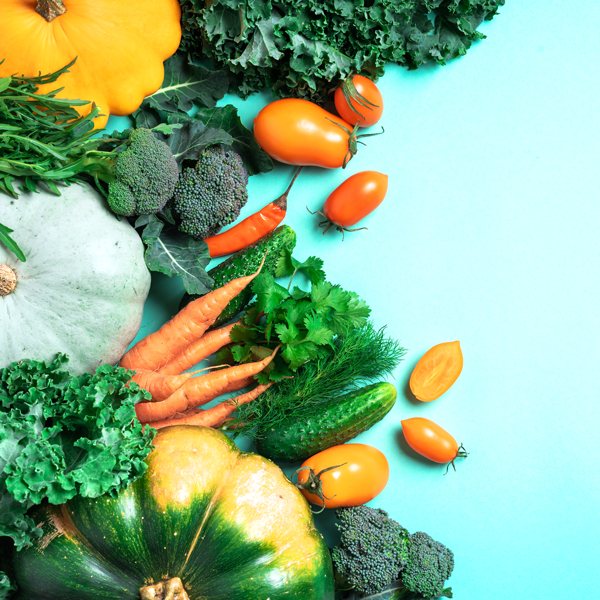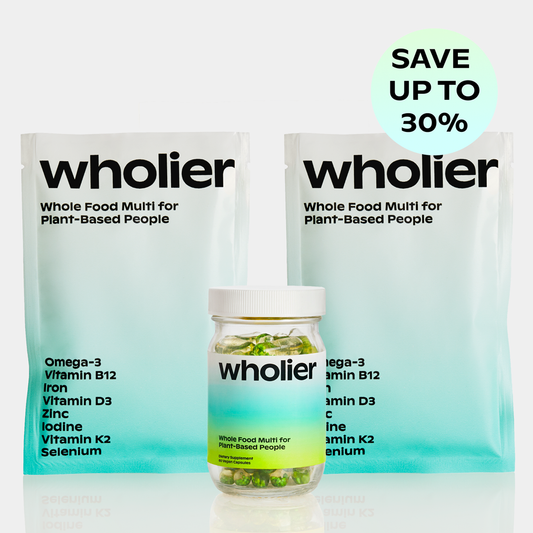
What is the Best Multivitamin for Vegetarians?
Learn about the essential nutrients to look for in the best multivitamin for vegetarians, including scientific research supporting the recommended dosages.
As more people adopt a vegetarian or vegan lifestyle, it's important to consider whether their diet is providing all the necessary nutrients for optimal health. One way to ensure that you're getting all the necessary nutrients is by taking a multivitamin supplement. However, not all multivitamins are created equal. In this article, we'll discuss what to look for in a multivitamin for vegetarians and the most important nutrients to include.
Why Do Vegetarians Need Multivitamins?
Vegetarians, especially those who follow a vegan diet, may be at risk of nutrient deficiencies due to the restrictions of their diet. For example, vitamin B12 is primarily found in animal products and is essential for red blood cell formation and nerve function. Vegans who do not supplement with vitamin B12 may be at risk of deficiency (1). Other nutrients that may be lacking in a vegetarian diet include iodine, vitamin D, iron, and zinc (2). While it is possible to obtain these nutrients from plant-based sources, it can be challenging to consume enough of them to meet the recommended daily intake (3). Therefore, taking a multivitamin can help ensure that you're getting all the necessary nutrients for optimal health.
What to Look for in a Multivitamin for Vegetarians
When choosing a multivitamin for vegetarians, there are a few key factors to consider. First, make sure the multivitamin contains an adequate amount of vitamin B12. Vitamin B12 is essential for red blood cell formation and nerve function and is primarily found in animal products. Look for a multivitamin that contains at least 150 mcg of vitamin B12.
Second, consider the form of the multivitamin. Some multivitamins contain gelatin, which is derived from animal bones and skin. Look for a vegetarian or vegan multivitamin that does not contain gelatin.
Third, check the label for other important nutrients, such as iodine, vitamin D, iron, and zinc. These nutrients are commonly lacking in a vegetarian diet and are important for thyroid health, bone health, red blood cell formation, and immune function. Look for a multivitamin that contains an adequate amount of these nutrients.
Lastly, consider the dosage and frequency of the multivitamin. Some multivitamins require multiple pills per day, while others only require one. Choose a multivitamin that is convenient for you to take and fits within your budget.
Important Nutrients to Include in a Multivitamin for Vegetarians
Vitamin B12
As previously mentioned, vitamin B12 is essential for red blood cell formation and nerve function. Vegans who do not supplement with vitamin B12 may be at risk of deficiency (1). Look for a multivitamin that contains 100-150 mcg of vitamin B12.
Iodine
Iodine is important for thyroid health and is primarily found in seafood and iodized salt. Vegans who do not consume these foods may be at risk of iodine deficiency (4). Look for a multivitamin that contains at least 100 mcg of iodine.
Vitamin D
Vitamin D is important for bone health and immune function. While it is possible to obtain vitamin D from sunlight, it can be challenging to get enough during the winter months or if you live in a northern climate. Vegans who do not consume fortified foods or supplements may be at risk of deficiency (5). Look for a multivitamin that contains at least 600-800 IU of vitamin D.
Iron
Iron is important for red blood cell formation and immune function. While it is possible to obtain iron from plant-based sources such as beans and leafy greens, the iron in these foods is less readily absorbed by the body than the iron in animal products (6). Vegetarians who do not consume iron-rich plant foods or supplements may be at risk of deficiency. Look for a multivitamin that contains at least 8 mg of iron.
Zinc
Zinc is important for immune function, wound healing, and DNA synthesis. While it is possible to obtain zinc from plant-based sources such as legumes and whole grains, the zinc in plant foods is less readily absorbed by the body than the zinc in animal products (7). Vegetarians who do not consume zinc-rich plant foods or supplements may be at risk of deficiency. Look for a multivitamin that contains at least 11 mg of zinc.
Clinical Studies on Multivitamins for Vegetarians
Several clinical studies have investigated the effectiveness of multivitamin supplements in vegetarians. A randomized controlled trial published in the American Journal of Clinical Nutrition found that a multivitamin supplement improved vitamin B12 and iron status in female vegetarians (8). Another study published in the Journal of Nutrition found that a multivitamin supplement improved vitamin B12 status in vegan women (9). Additionally, a systematic review published in the Journal of the Academy of Nutrition and Dietetics found that multivitamin supplements can help vegetarians meet their recommended nutrient intake (10).
Taking a multivitamin supplement can help ensure that vegetarians are getting all the necessary nutrients for optimal health. When choosing a multivitamin, make sure it contains at least 150 mcg of vitamin B12, is gelatin-free, and contains adequate amounts of iodine, vitamin D, iron, and zinc. Clinical studies have shown that multivitamin supplements can improve nutrient status in vegetarians and help them meet their recommended nutrient intake. As always, it’s important to consult with a healthcare professional before starting any new supplement regimen.
Sources:
(1) Pawlak R, et al. The prevalence of cobalamin deficiency among vegetarians assessed by serum vitamin B12: a review of literature. Eur J Clin Nutr. 2014;68(5):541-548.
(2) Craig WJ, Mangels AR. Position of the American Dietetic Association: vegetarian diets. J Am Diet Assoc. 2009;109(7):1266-1282.
(3) Mangels R, et al. The Dietitian’s Guide to Vegetarian Diets: Issues and Applications. Jones and Bartlett Publishers; 2010.
(4) Krajcovicová-Kudlácková M, et al. Iodine deficiency in vegetarians and vegans. Ann Nutr Metab. 2003;47(5):183-185.
(5) Holick MF. Vitamin D deficiency. N Engl J Med. 2007;357(3):266-281.
(6) Hurrell R, Egli I. Iron bioavailability and dietary reference values. Am J Clin Nutr. 2010;91(5):1461S-1467S.
(7) Sandstrom B. Bioavailability of zinc. Eur J Clin Nutr. 1997;51:S17-S19.
(8) Kristensen NB, et al. Multivitamin supplementation improves serum vitamin B12 and folate concentrations in female but not male pregnant women. Am J Clin Nutr. 2016;104(1):80-86.
(9) Herrmann W, Schorr H, Obeid R, et al. Vitamin B-12 status, particularly holotranscobalamin II and methylmalonic acid concentrations, and hyperhomocysteinemia in vegetarians. Am J Clin Nutr. 2003;





